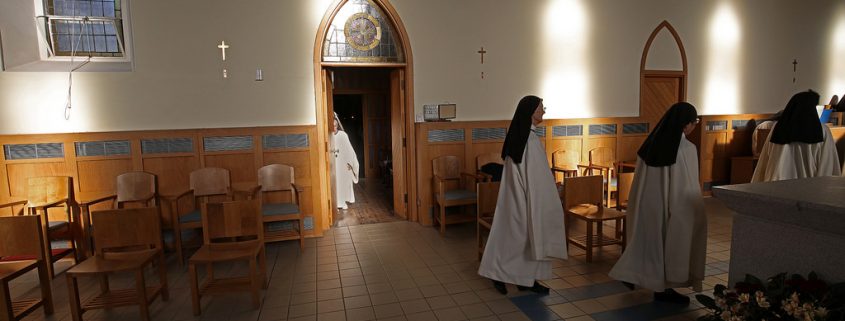Vision of the Cistercian Order
Chapter Talk: 3rd Sunday B 2018
On Tuesday last we shared on Dom Gerard’s paper on his ‘Vision of the Order’. It struck me afterwards that he is talking not only about our seeking God but also about God seeking us. Cistercian conversatio is a response to God’s call. Just as God called Jonah to repentance and the Lord Jesus called Simon and Andrew to follow him so he continues to call the church and individual people like ourselves to recognize the signs of God’s kingdom, to repent and believe the Good News. Dom Gerard’s use of images like ‘pure receptivity’, ‘fundamentally receptive’, ‘where God can disclose himself as God’, ‘where God and His Christ can be disclosed as the true centre’ speak to me of an attitude of attentive inner listening and availability to his call and grace, an expectant silence in our inner hearts, a joyful longing to see God’s face and hear his voice – all of which is fulfilled and brought about through our being one Spirit in Christ through the Church.
The Church had its beginnings when some fishermen from Galilee meet Jesus, were open and receptive to his presence and were won over by his voice, his presence, his warm and strong invitation: ‘Follow me, and I will make you fishers of people’ (Mk 1:17) From the very beginning the Lord Jesus tried to draw people together, into a body, a Church. There is no opposition, no separation between Christ and the Church but there is a mysterious deep unity between Christ and his Church and so the Risen Christ is always with us, always contemporary, always drawing us to become one spirit with him.
For ourselves, as a local church centred on Christ, and desiring to be wholly receptive and responsive to his Spirit, what might it mean ‘to repent and believe the Good News’?
- To live in the awareness that the Spirit of Jesus is within and among us inviting us to live in union with him in spousal love
- To listen with the inner ear of our heart: to the psalms, to the readings, to the Rule, to each other, in a readiness to know what God wants: ‘Lord, make me know your ways’ Resp psalm (24)
- Gradually allow the beliefs and values of monastic tradition shape and direct/challenge our own thinking and choices. Give expression to these same values in our own monastic journey
- Each one of us has set out on a spiritual journey, a journey towards deeper union with Christ, a journey from forgetfulness of Christ to mindfulness of Christ, a journey from sin to grace, from confusion and disorder to purity of heart, a journey from the ego to the real self, a journey from a self centred life to a Christ centred life, from a secular culture to a monastic culture…follow the lead of grace that we may be instrumental in bringing about God’s Kingdom
- Try to relate to everyone in the community with respect, with reverence, with a welcoming attitude. Transcend past differences and misunderstandings. Begin again when there are misunderstandings
- St Paul: From his conversion on Christ was everything for Paul: I believe nothing can happen that will outweigh the supreme advantage of knowing Christ Jesus my Lord. Far from being a persecutor of Jesus he had become a passionate lover of Christ, ‘the chosen instrument to bring Christ’s name before pagans’ Acts 9:15 I want only the perfection that comes through faith in Christ.
- This transformation of Paul called for great humility and courage. It called for the surrender of his own ego “I live now not with my own life but with the life of Christ who lives in me” Gal 2:20. Paul was brought from a self reliant, self righteous perfectionism to total dependence on the grace of Christ, to an understanding that the community is the body of Christ, to a realization that the mystery of Christ is the mystery of death and resurrection. He knew that the way to true life was through the transforming pattern of death and resurrection.
- We consciously live in the faith of Jesus, in the love of Jesus, in the energy of Jesus, and we are transformed. This transformation is illustrated by a new spirit, the Spirit of Jesus.
- The call is to promote a culture of life in our society; to support all who are in difficulties; encourage community and a reaching out; bring out the best in each other and bring people to their highest potential non-violent in thought, word and action
– Mother Marie, Abbess of Glencairn Abbey



